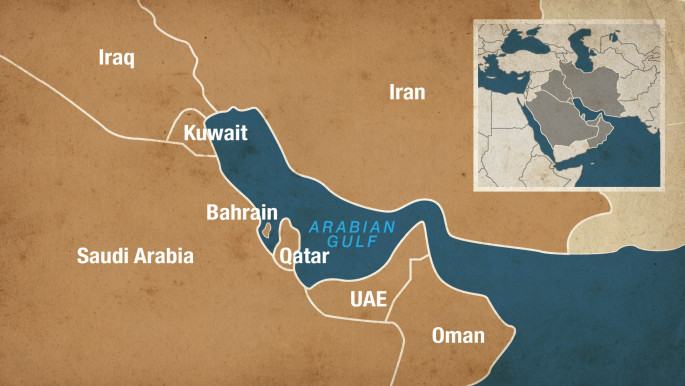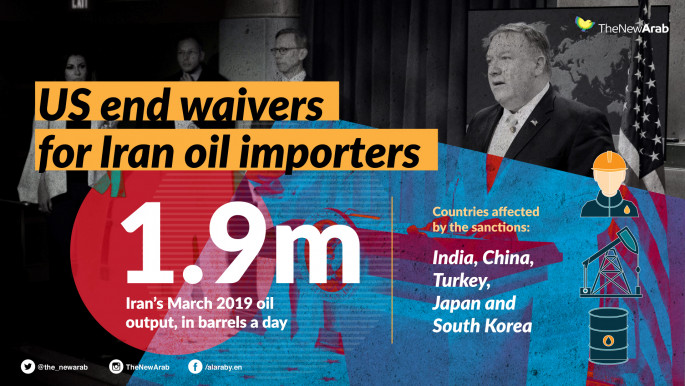
War in the Gulf: An inconvenient truth for the Iran hawks
Recently, tit-for-tat events have escalated tensions between the two longtime adversaries and may be bringing the two sides closer to an "accidental US-Iran war", regardless of repeated announcements of peaceful intentions.
Aircraft carriers are sailing, cargo ships are sabotaged, drones are attacking pipelines, bomber wings are deploying and sanctions are biting the Iranian people harder and harder.
Mainstream American newspapers warn that a war is "forthcoming" and others report that the White House is reviewing "military plans against Iran". Yet, President Donald Trump says he is not seeking war and on 14 May, Iran's Supreme Leader was quoted by state media as saying: "We don't seek a war, and they don't either. They know it's not in their interests."
Unfortunately, military options are capturing the headlines and diplomacy seems to have taken a back seat. Legitimate worries abound.
But let's backtrack a little. In May 2018, Trump made good on his campaign pledge to withdraw from the Joint Comprehensive Plan of Action (JCPOA), which he considered "disastrous", "catastrophic" and "poorly negotiated" by the Obama administration.
He followed by imposing stricter economic sanctions on Iran, further strangling the country's economy, and impeding access to basic humanitarian needs. The hope was that Tehran would be persuaded to renegotiate an agreement focusing on both the nuclear programme and its collateral missile programme.
 |
Behind all the sabre-rattling lie some inconvenient truths for the Bolton-Pompeo duo |  |
Around the world, nations have criticised the Trump plan, arguing the strategy has had the opposite effect, instead fueling anti-Americanism within the Islamic Republic and further emboldening those conservatives virulently opposed to negotiating with the Americans during the Obama administration and now the Trump administration. In many ways, Trump's strategy has reinforced the very arguments set out by the hardliners opposed to nuclear negotiations from the outset.
Since that time, the US has continued its "maximum pressure" campaign, slowly tightening the noose on oil sanctions, imposing financial impediments and designating key individuals. In the past few weeks it has removed exceptions on the ability of key allies to import oil from Iran and, in a first, designated Iran's entire Islamic Revolutionary Guard Corps (IRGC) a foreign terrorist organisation.
This comes after the IRGC has bested the US in Iraq, Syria, Lebanon and Afghanistan, with long-serving commander of its Quds Force, Maj. Gen. Qassem Soleimani now a household name, while American credibility has nosedived.
 |
|
Often described as "shadowy" in US media, Soleimani is expanding Iran's influence by military support to proxies in Iraq, Syria, Yemen and Lebanon, as well as a longstanding campaign of what the United States characterises as "malign activities" - intimidation, assassinations and other covert operations.
Further reports suggest the Iranians planned to share long range missiles with Iranian backed proxy forces in Iraq, leading to a quick trip to Baghdad by US Secretary of State Mike Pompeo.
 |
Trump has not wavered from his opposition to more overseas military adventures |  |
This week, the Iranians were accused by the US of sabotaging two Saudi oil tankers docked in UAE ports. In the latter instance, an Iranian source close to the Supreme Leader laughed off the allegation, saying: "If the Iranians were behind those attacks, those ships would not be floating, they would be at the bottom of the bay." Drone attacks against Saudi oil pipelines soon followed.
The source also described the timing of the alleged attacks as "convenient" and "theatrics", especially as US National Security Advisor John Bolton and Secretary of State Mike Pompeo are characterised in Iran as actively stoking the prospects of a military operation.
According to a New York Times report, an updated US military plan involves sending as many as 120,000 troops to the Middle East should Iran attack American forces.
Inconvenient truths
Behind all the sabre-rattling lie some inconvenient truths for the Bolton-Pompeo duo.
No matter how tough and bellicose their pronouncements, Trump has been consistent since his days on the campaign trail that he would withdraw American troops from costly "forever wars" and he has made good on that promise so far in both Afghanistan and Syria.
Read more: 'Fake news': Trump denies deployment of 120,000 troops to counter Iran
Additionally, his reelection campaign is beginning to ramp up against 21 Democratic aspirants, all of whom would use any military confrontation with Iran against him. Most important, there is neither domestic support, appetite nor appeal for war with Iran.
None of this is lost on Iranian policymakers, politicians and hardliners. They may hear Bolton and Pompeo banging on the war drums, but to mix metaphors, those war drums are empty vessels.
 |
|
Like the Taliban in Afghanistan, Nicolas Maduro in Venezuela and Kim Jong-Un in North Korea, the Iranians do not believe the US has the stomach for war, and while Trump may be the most mercurial of world leaders, he has not wavered from his opposition to more overseas military adventures.
Among Iranian officials, there appears to be confidence that they could protect their regime and the Islamic Revolution in any conflict, despite the high cost. They seem certain the Americans would never put "boots on the ground" and may be overconfident in their ability to withstand a combined air and naval campaign.
 |
At least one of the parties, if not both, may not be operating as a rational actor |  |
"Their billion [-dollar] fleet can be destroyed with one missile," Ayatollah Yousef Tabatabai-Nejad, a senior cleric who sits on the government's Assembly of Experts, was quoted as saying by Iran's state-run ISNA news agency.
While it would be costly, Iranian officials believe a pyrrhic victory would still be worthwhile.
Despite the bravado on both sides, "It's a war everyone would lose and the US definitely wouldn't win," said one source.
War would inevitably damage or destroy the prolific oil and gas installations in the Gulf, and any country with tankers in the area seen to be cooperating with the Americans would be fair game.
Read more: US deploys B-52 bombers in Qatar amid Iran tensions
A war would essentially strip global markets of one fourth of the world's oil and gas exports, potentially creating a global economic meltdown far exceeding the 2008 financial crisis. Despite the talk of fracking, renewable energy and conservation, the world still runs on oil and too much of that oil still comes from the Iran and its neighbours.
On top of the economic effects, a war could significantly shift the power dynamics in the region. Gulf monarchies would see modernisation plummet along with global markets.
The US would probably be forced out of Iraq by a government friendly to Tehran and could be shown the door by several countries tired of being the battlefield and the bill-payer for US-Iranian competition.
Future US presidents may no longer see the value in a long-term commitment to the region, and many countries who have stood against Iran behind a US defense shield may be forced to become more accommodating to the Iranian regime. To those in the US looking for a fight, it may be more important to consider the day after the fight.
Misreading the tea leaves
If Bolton and Pompeo believe that military buildups and stand offs will achieve a change in Iranian behaviour, they might want to revisit that belief.
They work for a president who pushes back on military force as an all-purpose tool, and they face an Iran irrationally willing to push the US to the edge. At least one of the parties, if not both, may not be operating as a rational actor.
They may also be misreading the power relationships within Iran. Hardliners have been strengthened and self-justified by recent tensions. To them, negotiating with the Americans would be appeasement, and tantamount to inviting the Americans to more intimidation in the future.
 |
If Bolton and Pompeo believe that military buildups and stand offs will achieve a change in Iranian behaviour, they might want to revisit that belief |  |
The government, too, appears strengthened, and seems willing to protect the Revolution at the cost of hundreds of military targets and the collateral consequences to everyday Iranians.
And most importantly, they may have misread the American people they serve.
No amount of paternalism can convince the American public that a military fight against Iran is worth putting troops, pilots and sailors in harm's way.
They are suspicious, perhaps intolerant, of another group of unelected officials that present another Middle East crisis as another existential threat and they, echoing a British rock song of the 60s, "…won't get fooled again".
And oddly (some would say troublingly), the only one who may be able to reverse a snowballing risk of armed conflict may be Donald Trump.
Tanya Goudsouzian is a Canadian journalist who has covered Iraq and Afghanistan for over 15 years. She is former Opinion editor of Al Jazeera English Online.
Follow her on Twitter: @tgoudsouzian
Opinions expressed in this article remain those of the author and do not necessarily represent those of The New Arab, its editorial board or staff.





 Follow the Middle East's top stories in English at The New Arab on Google News
Follow the Middle East's top stories in English at The New Arab on Google News


